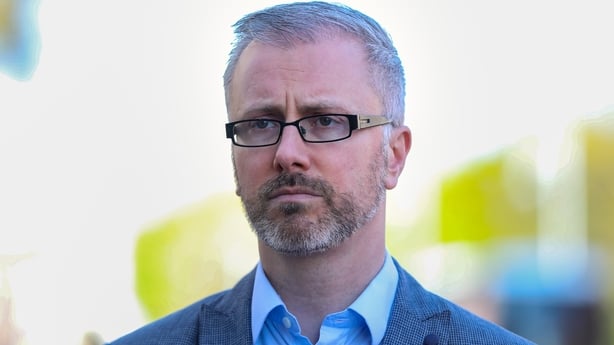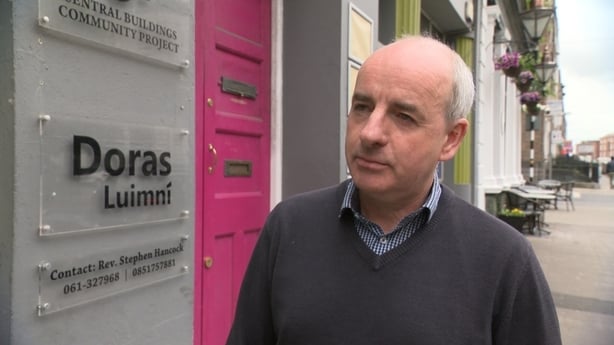The number of people coming here from Ukraine will fall as a result of the changes agreed at Cabinet, Minister for Integration Roderic O'Gorman has predicted.
The Government has agreed to reduce welfare rates and to limit State accommodation for new arrivals from Ukraine to 90 days.
The current rate of €220 per week will fall to €38.80 for the period that Ukrainian people are in State accommodation.
However, they will revert to the higher welfare rate when they leave these centres.
Meanwhile, the parents of children in State accommodation will continue to receive the full monthly child benefit payment of €140.
The Government will soon launch a communications campaign advising Ukrainians thinking of coming to this country that they will only get State accommodation for 90 days.

The campaign will also emphasise the realities of the home rental market here, the minister said.
Mr O'Gorman believes that the changes, which will be introduced in late January or early February, will not lead to a rise in homelessness.
He said that had not happened when changes were made in other EU states to the "offering" for those fleeing the war in Ukraine.
The minister said Ukrainians are a mobile population who could look to travel to another EU state or return to their country.
People arriving here from Ukraine from early next year will be housed in reception centre before having to find a place to live after 90 days.
There will only be flexibility allowed for people who are medically vulnerable.
Earlier, Taoiseach Leo Varadkar said Ireland was now bringing its "offering" to Ukrainian people in line with other EU states.
The Taoiseach confirmed that the Government would continue to try to source further accommodation for those seeking refuge here including hotels, refurbished buildings and B&Bs.
Sinn Féin leader Mary Lou McDonnell said she was concerned that there was not a plan in place to accommodate people for 90 days and it was not clear where they will find a place to stay after this period.
Efforts to encourage Ukrainian people living here to find work will also be stepped up.
This will see the Department of Social Protection interviewing Ukrainian welfare recipients with a view to matching them to available jobs.
There will be no change to the legal right of Ukrainian children to seek to enrol in a local school.
Mr Varadkar told the Dáil that "education will remain available to children coming from Ukraine as well as the provision of medical cards" to those fleeing the war.
If there are not enough school places beside new accommodation centres, then children could be bussed to the next nearest school.
Some children may not enrol straight away, but this already happens when families are waiting to see where they are accommodated.
Crucially, there will be no shadow schools in the new accommodation centres.
It is expected that the Department of Children will provide activities and youth work for children in these centres.
Earlier, Opposition politicians attacked the plans to reduce welfare supports.
Speaking outside Leinster House, Labour TD Ged Nash said the Government had failed to build accommodation specifically for refugees.
He claimed Minister O'Gorman had been left "exposed" by Fianna Fáil and Fine Gael.
People Before Profit TD Richard Boyd Barrett said the decision to reduce supports for Ukrainian refugees was a "cynical deflection" from the "failure" to address the housing crisis.

Increased homelessness fears
John Lannon, Chief Executive of migrant support charity Doras, said he fears that if the 90-day limit on accommodation is imposed on Ukrainian refugees it will increase homelessness.
Speaking on RTÉ's Morning Ireland, he said: "It will put people in precarious positions and it's likely to leave women, children and men on the streets.
"We know that there are already 6,000 people stuck in Direct Provision, who have refugee status, but they can't leave because there's no affordable accommodation.
"We do have to also note that the problem here is that the Government hasn't done enough to provide mid-to-long-term accommodation.
"They need to do that for both beneficiaries of temporary protection and for international protection applicants, we and others have been saying this for a year and a half now, but it still hasn't happened.
"The Department of Children are still carrying the can when it comes to finding accommodation. Civil society, of course, has played its part as well, pledging rooms and vacant homes the length and breadth of the country.
"But it's now well past time to the Department of Housing became involved in providing for the needs of people coming from Ukraine."
Mr Lannon said that the ongoing war in Ukraine is what is causing people to come to Ireland seeking temporary protection and "the Government have been talking about pull factors, but we know from research that's been done and we know from our years working in this area that it's a desire for safety that's most significant rather than access to benefits when it comes to refugee movements".
He acknowledged that there has been "secondary movements".
"There have been movements out of Ireland as well as into Ireland," Mr Lannon said.
"We must remember when we look across countries that we're not comparing like with like. Cost of living differs. First of all, Ireland generally gives support in terms of income rather than services.
"Other countries might give people from Ukraine a lesser amount of money, but they might make free childcare available, for example, so providing people with €38.80 week is very inadequate and we know that from the experiences of international protection applicants and Direct Provision, we know it's not possible to get children ready for school.
"We know it's not possible to cover other basic needs on that amount."






